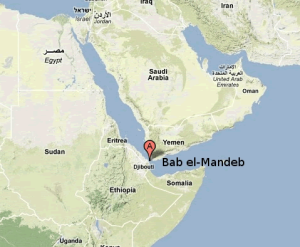Philippe Potel-Belner
Potel-Belner, Philippe
 Philippe Potel-Belner is a French historian, archaeologist and philologist(c), who is convinced that India was home to Atlantis. He specifies the long western coastal plain of India(a), which is beyond the Pillars of Heracles, identified by him as Bal-el-Mandeb(b).
Philippe Potel-Belner is a French historian, archaeologist and philologist(c), who is convinced that India was home to Atlantis. He specifies the long western coastal plain of India(a), which is beyond the Pillars of Heracles, identified by him as Bal-el-Mandeb(b).
He also suggests(c) that the events recorded in the Atlantis texts probably took place in the 4th millennium BC and are an account of the history of the Dravidian civilisation.
(a) Archive 4890 *
(b) https://www.academia.edu/3339364/PLATO_revisited_what_he_precisely_said_about_Atlantis (French)(Offline Nov.2015)
(c) à la recherche de la langue du Moyen Age (archive.org) (French) *
Bab-el-Mandeb
 Bab-el-Mandeb, which means gate of tears, is the name given to the strait at the southern end of the Red Sea and has been identified as one of the two routes taken by humans ‘out of Africa’ around 120,000 years ago, the other being through Sinai.
Bab-el-Mandeb, which means gate of tears, is the name given to the strait at the southern end of the Red Sea and has been identified as one of the two routes taken by humans ‘out of Africa’ around 120,000 years ago, the other being through Sinai.
The Strait has also been identified by some researchers as the location of the Pillars of Heracles referred to by Plato. This idea is advocated by Jacques Hébert, Thérêse Ghembaza and Sunil Prasannan who have respectively located Atlantis at Socotra, Meroë and Sundaland.
The French historian Philippe Potel-Belner also identifies Bab-el-Mandeb as the Pillars of Heracles(c) beyond which lay Atlantis on a long plain on the west coast of India(b).
>Atlantisforschung has also pointed out that Radek Brychta was another one to nominate Bab-el-Mandeb as the site of the ‘Pillars’(d).<
A fictional account of the destruction of Atlantis in the Red Sea and its relationship with the biblical Deluge by Orson Scott Card is now available on the Internet(a).
(a) http://www.hatrack.com/osc/stories/atlantis.shtml
(b) https://www.academia.edu/3480936/Atlantis_myth_legend_History (French) (offline Nov. 2015)
(c) https://www.academia.edu/3339364/PLATO_revisited_what_he_precisely_said_about_Atlantis (French) (offline Nov.2015)
(d) Säulen des Herakles – Atlantisforschung.de (atlantisforschung-de.translate.goog) *
India *
India, which at first sight to Europeans might appear an improbable candidate, has not escaped the attention of Atlantis seekers. For the sake of simplicity, I use the term ‘India’ as employed before independence so as to include Pakistan, in order to accommodate most of the Indus Valley area of influence, which straddled both those modern states. Awareness of the region was boosted by the investigations of Graham Hancock and recorded in his book Underworld, which prompted a flurry of speculation(a)(c).
More recently a wall was discovered just 3 metres below the surface of the sea off the coast of Konkan on the west coast of India. The structure stretches over many kilometres (possibly as much as 25 km) and has been dated to 8000 BC(j). At the northern end of the Konkan Coast lies the Bay of Cambay, where the discovery of a large sunken city has also generated claims of great antiquity. A paper(r) by Badrinaryan Badrinaryan proposed that this ‘great metropolis’ had lasted from 13,000 BP until 3000 BP!
It may be informative to read a more sceptical commentary on discoveries in the Bay of Cambay. In a lengthy article, Paul V. Heinrich wrote – “Given the significance of the claims being made for artefacts recovered from the Gulf of Cambay, remarkably little, if anything has been published. As of the time that this article was written, nothing has been published in any scientific literature about these artefacts. At this time, the only known source of pictures had been newspaper articles, popular books (Hancock 2002a), and web pages (Hancock 2002b). Being an experienced archaeological geologist familiar with lithic materials used to prepare artefacts and concretions created by both pedogenic and marine processes, these artefacts naturally attracted my attention. However, an examination of the artefacts illustrated by Hancock (2002b) generated considerable scepticism on my part as to whether many of these so-called “artefacts” illustrated by Hancock (2002b) are really artefacts.”(u)
Further interest was generated by suggestions that the Indus Valley civilisation could also have had an Atlantis connection.
In Search of the Cradle of Civilization: New Light on Ancient India[0817] is a ground-breaking book wherein its three authors, Feuerstein, Kak & Frawley, argue that there was no “Aryan invasion” and that India, not Sumer, was the cradle of civilized humanity.
P. N. Oak (1917-2007) the Indian history revisionist has gone as far as to claim that the British Isles had once been ruled by India(l)(t)!
An Indian researcher, P. Karthigayan, had prepared a paper for the 2005 Atlantis Conference on Melos entitled ‘The Origin of the Atlantis Civilisation through Tamil literary evidence’, however, circumstances prevented his attendance. Another Indian anthropologist, Amlan Roychowdhury, an anthropologist, also proposes(b) that the Vedic culture of India is a remnant of the Atlantean civilisation. March 17th 2013 saw an article(i) published in the Sunday Observer of Sri Lanka by Neil Kiriella, in which he proposed that Plato’s Atlantis story was a reworking of the destruction of Lankapura as recorded in the Ramayana.
In an October 2015 article by blogger Abo Rashad, he outlined in some detail similarities between Vedic civilisation and that of ancient Egypt. He concluded with the following comment, “ There are evidences galore that Vedic civilization was the precursor of all major civilization in the world. Similarities between the Egyptian civilization and the Vedic civilization and the evidence of the latter being the progenitor of the earlier is but one example. There are plenty of similarities between Vedic and Celtic civilization, between Vedic and Anatolian civilization, between Vedic and Mayan civilization etc. The question is the similarities between one and many.”
Sergey Teleguin is a Russian professor of Philology and a leading advocate of the idea that the city of Tripura (Triple City) in Vedic tradition was the original inspiration behind Plato’s city of Atlantis. In support of his contention, he has outlined a number of parallels between Plato’s account and the sacred texts of India, the Puranas and Mahabharata in an extensive English excerpt(n) from his 2005 Russian book, Anatomy of a Myth[1122].
The Malagabay website published a lengthy article(l) in July 2016, offering evidence along with some conjecture, supporting the radical idea that the Sea Peoples had originated in India and having migrated westward, some of them reached the Aegean and became known as Dorians! The author of the article appears to have followed the ideas of Edward Pococke published in his India in Greece[1231].
Martin Freksa has a totally different view of where India fits into the Atlantis saga by maintaining that Atlantis while pursuing world domination, was destroyed by atomic weapons aboard missiles launched by India around 3000 BC.
David Hatcher Childress has written Vimana Aircraft of Ancient India and Atlantis[1252] in which he discusses the vimanas, the ancient Indian flying machines(s) and for good measure includes the vailxi aircraft of the Atlanteans, the latter being first mentioned in 1894 by the author of A Dweller on Two Planets[1014].
James Hartman, quoting from the Agastya Samhita offers(m) intriguing evidence that the ancient Indians had the ability to make batteries, the design of which is rather reminiscent of the Baghdad Battery!
Cedric R. Leonard in an article on pre-Platonic references to Atlantis(e) identified what he believed are relevant in the ancient writings of India(v).
Ashok Malhotra has proposed that the ancient submerged Indian city of Dwarka provided the inspiration for Plato’s Atlantis story(d).
Qusai Ayman Naser writing in 2013 from Syria also suggested India as holding the location of Atlantis, specifically in the Bay of Bengal(h).
The French historian Philippe Potel-Belner also identifies Bab-el-Mandeb as the location of the Pillars of Heracles(g) beyond which lay Atlantis on a long plain on the west coast of India(f). He has recently drawn attention to the Farasan Islands, near Bab-el-Mandeb, where a Latin inscription could be interpreted as supporting the locality as the site of the ‘Pillars’ (n).
In March 2019, Eugenio B. Ralbadisole offered the highly speculative theory that Atlantis had been situated in India, in an article(o) on the Ancient Origins website. He specifies its location as the Girinagar Mountains of the Junagadh District of Gujarat in western India as its location. His ideas are more fully outlined in a paper on the Academia.edu website.(p)
Apart from any association with Atlantis, Gene Matlock has made the unexpected claim that there is “100% Non-Contestable Proof!” that ancient India had conquered the Americas(q)!
Also See: Yashwant Koak, Dholavira and Kumari Kandam
(a) See: Archive 2051
(b) IS VEDIC CIVILIZATION THE REMNANTS OF THE LEGENDARY ATLANTIS | Vedic Vidyalay ????? ???????? (archive.org) (26 pages)
(c) Indian Atlantis? (archive.org) *
(d) In Search of Atlantis — Getting Closer (archive.org)
(e) See: Archive 2055
(f) See: Archive 2056
(g) See: Archive 2057
(h) See: Archive 5135
(i) See: Archive 2058
(j) See: Archive 2059
(k) See: Archive 2723.
(l) Catastrophic English: India In Greece | MalagaBay (archive.org)
(m) https://www.sacred-texts.com/ufo/ourpast.htm
(n) langue et histoire – ACTUALITES (archive.org)
(o) https://www.ancient-origins.net/unexplained-phenomena/atlantis-india-0011657
(q) http://www.viewzone.com/gene.india.html
(r) Gulf of Cambay: Cradle of Ancient Civilization | Archaeology Online (archive.org)
(s) Ancient Indian Aircraft Technology (bibliotecapleyades.net)
(t) P N Oak: World Vedic Heritage | MalagaBay (wordpress.com)
(v) The Vimana Epics (Expanded Knowledge-base) | Ancient Astronaut Archive (one third way down page) *
